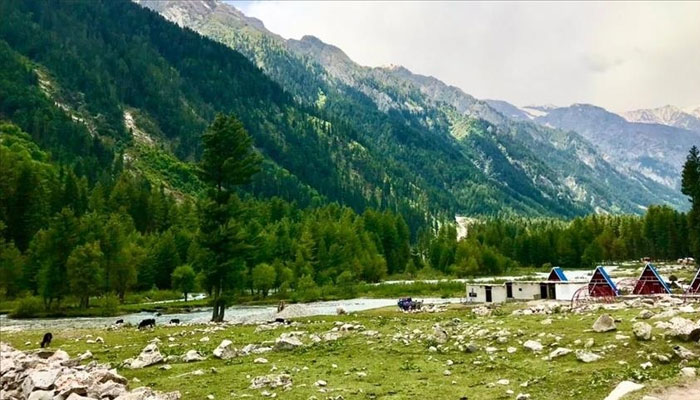
[ad_1]
Scenic destinations losing tourists’ attraction who usually flock to visit snow-capped mountains in winters
Pakistan’s northern parts are yet to receive the first snowfall of this season which is bringing down the tourist influx to the popular destinations, including the picturesque Kalam and Malam Jabba valleys.
The Kalam Valley, located some 326 kilometres from the capital city of Islamabad, rely upon income via tourism at this time of winter, usually packed with tourists in its streets and hotels to absorb the eye-catching view of snow-capped mountains.
Additionally, the lack of snowfall would also impact agriculture, fishing and hydroelectricity in the region which is now sporting a brown and barren look.

The northwestern region normally receives moderate to heavy snowfall between the middle of December and the end of January.
After facing back-to-back climate calamities, the country’s northern and northwestern parts are now facing a new challenge of snowless winters which would start compressing the economic nerve of Kalam and Malam Jabba valleys of scenic Swat, often referred to as the “Switzerland of Pakistan.”
As per Anadolu’s report quoting a local hotel owner, the region witnessed a 60% to 70% decline in the number of tourists for an obvious reason: snowless winter.
“Last year, it was a packed season. We had to arrange extra rooms to cope with the number of tourists. But today, 70% of our rooms are vacant despite a concession in rates,” he added.
The situation is not different in adjoining Malam Jabba, home to the country’s biggest ski resort and the core of winter sports festivals, as the hotels lay vacant, while shopkeepers and transporters kill their time with idle chitchat.
“We are praying for snowfall. That would mean a lot to us. Snowfall is a lifeline for our economy,” Mohammad Adil, who runs a hotel in the main Malam Jabba bazaar, told the Ankara-based news agency.
The country’s northern Gilgit Baltistan (GB) region, located at the confluence of the world’s greatest mountain ranges – the Karakoram, the Himalayas, the Hindu Kush and the Pamir Mountains – and home to five of the 14 peaks above 8,000 metres, received light snowfall in November last year, but the peak season is still snowless.
Iqbal Hussain, director of GB’s Tourism Department, told the foreign media outlet: “Snow runs our entire economy, in terms of tourism, fishing, agriculture and hydroelectricity. No, or less snowfall means less water, and subsequently, less fishing and less farming, aside from power shortages.”
He explained that no or less snowfall would mean early spring water would be a big problem for local farmers and those associated with the fishing sector, aside from causing a further decrease in underground water levels.
The tourism department’s top officer said although the region does not primarily attract regular snow-loving tourists, it has traditional winter activities which are likely to be affected by the lack of snow this year.
The situation has forced his department to shift the venue for this year’s “winter feast,” a traditional winter recreational festival, from Hunza valley to Ghizer district.
Pakistan is among the top 10 countries vulnerable to the challenges related to climate change and global warming, although its share in the release of planet-warming gases is less than 1%.
Environmentalists reckon that climate change has gradually turned the region’s weather patterns “erratic” and “extreme” in recent years, which has resulted in unpredictable rains, snowfall and long drought spells.
“Although we cannot associate one particular phenomenon as a whole result of climate change, it’s true that weather patterns have become erratic and unpredictable because of that over the years,” Sardar Sarfraz, director at the Pakistan Meteorological Department (PMD), was quoted as saying.
“Pakistan has so far received 92% and 80% less rains in December and January compared to this period last year,” Sarfraz said while detailing the impacts of climate changes.
The lack of rains and snowfall is because the “westerly waves” system that brings these to the region has not properly developed so far, he explained.
However, he said Pakistan’s northern and northwestern regions are likely to receive “good rains” by the end of this month, though they would still be less compared to last January.
[ad_2]
Source link